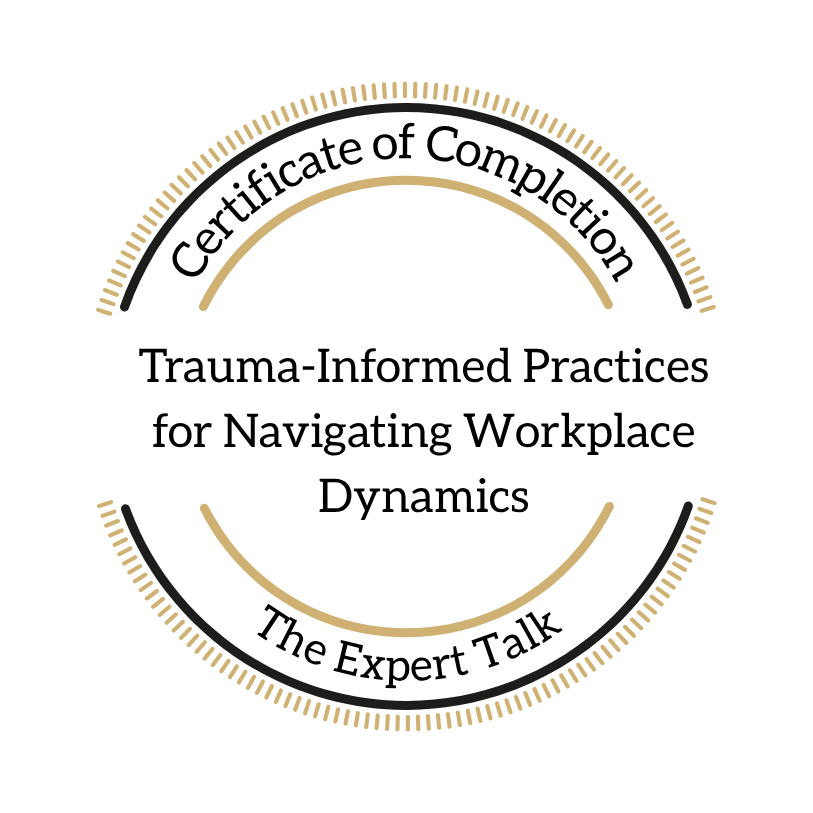Get Your Team Certified in Trauma-Informed Practices for Navigating Workplace Dynamics

What It Means Mean to be Trauma-Informed
In Safety There Is Trust
Being trauma-informed means recognizing that people carry unseen wounds—and then working to intentionally create environments, conversations, and systems that feel safe, supportive, and empowering as a result.
It doesn’t mean we need to know everyone’s background story—in fact, we don’t want to. It means we assume everyone has one, and we act with care accordingly.
In practice, this looks like:
Understanding the Impact of Past Experiences: Understanding that trauma isn’t just about “big” events—it's about how the nervous system responds to experiences of overwhelm, threat, helplessness, or uncertainty. Past experiences shape how people show up, trust, behave, and interact with others.
Being Curious: Instead of asking, “What’s wrong with you?”, we shift to, “What happened to you?” We recognize that reactions like anger, defensiveness, or shutting down are protective, not personal.
Prioritizing Safety and Trust: We create spaces where people feel physically, emotionally, and psychologically safe. This includes:
- Being consistent and clear
- Respecting boundaries
- Following through on what we say
- Letting people have agency over their participation
Empowering Choice: Trauma often involves a loss of control. Trauma-informed practices restore that by giving people voice, choice, and flexibility wherever possible.
Practicing Cultural Humility: We recognize that trauma doesn’t exist in a vacuum—it intersects with racism, systemic injustice, identity, and lived experience. Being trauma-informed includes being culturally responsive and willing to unlearn bias.
Developing Self-Awareness: We practice calming our own nervous system, so we don’t escalate tension or re-trigger others. Grounded leaders and team members help create grounded environments.
What People Are Saying …
“Best I've ever attended…”
“I've worked in Human Services for nearly 30 years and have attended hundreds of training. sessions This is, by far, the best workshop I've ever attended.”
“Beautiful Workshop”
"I just want to say thank you so
much for this beautiful
workshop. Your facilitation was
easy to follow, well paced, and
truly informative. I loved this
session and look forward to the
next follow up!"
“I can't believe…”
“I practiced some of the strategies we learned in Trauma-Informed Workplaces with my university-aged kids over the holidays and can't believe how much easier conversations were!"
How It Works
- 1 -
ENROLL
Choose your training dates
- 2 -
TRAIN
Attend live facilitator-led training
(Three 4-hour sessions)
- 3 -
PRACTICE
Put new skills & strategies into practice and experience shifts in workplace culture
How Is This Different From Other Training Courses?
All the checklists, guides, processes, roadmaps, toolboxes, and scripts in the world won't be effective if they're used without an understanding of why people are the way they are, and why they behave the way they do. This training offers the tools and strategies teams need to work together, built on a foundation of curiosity, self-awareness, and empathy that opens the door to building and maintaining trust.
The models and frameworks participants will discover live primarily in the worlds of neuroscience, psychology, and therapy. Bringing them into workplaces (and, as an extension, into peoples’ personal and family lives) results in the self-awareness needed to create psychological safety in organizations and beyond.
Why take this course?
Self-Awareness
We ourselves are the best strategy we have for connecting with and building trust with other people. To be aware is to create shifts in how we understand and relate to others.
Psychological Safety
Psychological safety depends on people feeling valued, empowered, and like they matter. This training offers participants a fundamental understanding of what makes us feel safe, and how to use that information to improve every single relationship and interaction they have with others.
Confidence
So many interpersonal issues in the workplace arise and remain unresolved because we worry about how the other person will react to us. Trauma-informed practices offer participants perspective, strategies, and awareness that builds confidence in all interactions with others.
“Should be a requirement”
“This training was very informational, practical, and enjoyable. I believe it should be a requirement for both leaders and employees. If our organization makes it more widely available I will certainly encourage my team to attend.”
“It will really help me...”
“Great course, and I think it will
really help me with my own
personal trauma.”
“Knowledgeable and empathetic”
“Excellent instructors! Very knowledgeable and empathetic. They quickly created a safe space where we were able to discuss course content and personal experiences freely! Thanks :)”
Trauma-Informed Practices for Navigating Workplace Dynamics Course Content
Day 1 (Module 1)—Trauma-Informed Workplaces & Teams
Live, Facilitator-Led (4 hrs)
This module introduces participants to the foundational concepts and practices of the trauma-informed mindset and framework. It is interactive with engagement opportunities that include small and large group discussion, activities, and exercises.
- Types & Roots of Trauma
- The Role & Importance of the Nervous System
- The Evolution of the Nervous System
- The Window of Tolerance
- Dysregulation at Work
- Self-Regulation Strategies and Practices
- Self-Care and Boundary-Setting
- Proxemics in Relationships and Priorities
- Microboundaries
- Boundary-Setting Basics
- Bringing it Together—Exercise
- Creating Safe Spaces and Teams
- Acts of Safety
- Practices of Trauma-Informed Teams
- Post-Traumatic Growth
Day 2 (Module 2)—Collaborative Communication
Live, Facilitator-Led (4 hrs)
Day 2 focuses on specific communication strategies. Participants learn how to interpret the needs underneath emotions and behaviours so we can communicate clearly and effectively.
- What is Collaborative Communication
- Disconnecting vs. Connecting Frames
- The Four Action Steps of Collaborative Communication
- Observations vs. Evaluations
- Demands vs. Requests
- Empathetic Guessing
- Role Plays & Small Group Practice Scenarios
Day 3 (Module 3)—Navigating Workplace Conflict
Live, Facilitator-Led (4 hrs)
Day 3 covers strategies for navigating conflict and difficult conversations at work. Using a proven process, learn how to make even the trickiest conversations more comfortable and psychologically safe for everyone.
- Why Conflict Arises at Work
- Working With People We Don't Like
- Conflict Management Styles
- The 5 styles and how to work with each
- 5-Step Conflict Navigation Roadmap
- Back Pocket Scripts
- Practice exercise
Trauma-Informed Practices for Navigating Workplace Dynamics Course
$1,500 per person
Certificate Awarded Upon Successful Completion

Trauma-Informed Practices for Navigating Workplace Dynamics
“I carried a lot of misinformation”
“I am recommending this course to everyone. I realized through this course that I carried a lot of misinformation and misconceptions about peoples' behaviour.”
“Opened my eyes”
“I’ve spent 35 years learning
to ignore/push away what
my body is feeling and needs …
and this training has helped me learn what it’s been trying to tell
me all along”
“I feel much more comfortable”
“I would recommend this course to absolutely anyone! I learned so much during the three days with our instructors. So many things 'clicked' for me and now I'm finding myself applying trauma-informed practices to interactions with everyone.”
Inclusions
WORKBOOK
Printed workbook for each module with handouts, worksheets, activities, and references.
ONLINE RESOURCES
Fillable copies of workbooks, plus resources, reading lists, and a downloadable audio recording of a 5 Senses Check-In.
Bonus
APPLICATION SESSIONS
These follow-up sessions should take place approximately 30 days after training completion and are recommended to be optional for participants.
These sessions help to further cement strategies, tools, and practices for participants. Follow up support is both crucial for skill-building and a trauma-informed practice.
These guided sessions will review key concepts from the initial learning and will include small and large group discussion of mindset shifts, debriefing of challenges, and deeper dives into strategies.
Two Application Sessions are included with the workshop, and additional ones can be added.
Your Facilitators

kim van ryn
Trauma-informed leadership & neurodiversity expert
Kim Van Ryn
Kim (she/her) started her career as a Child and Youth Worker in foster and adoptive care, developing skills and gaining education in trauma and attachment theory. After a short break from the human services field, she returned to work in day services with adults with neurodiversities and found her true calling. Over the past years of professional development Kim has attained her BA in Human Services with honors, and her Trauma-Informed Care and Counselling certificate. She is continuously mentored to communicate more deeply with non-speaking people. Kim now offers therapeutic support to people with neurodiversities who have experienced emotional trauma.
With her team, Kim opened the doors to Branching Out Support Services in 2019 which supports people across the age span who live with developmental disabilities and neurodiversities.

jill mcpherson
collaborative communication expert
Jill McPherson
Jill (she/her) has over 25 years of experience in education and leadership. She brings a rare blend of practical insight, emotional intelligence, and deep compassion to her work with organizations, teams, and schools. Grounded in the principles of Nonviolent Communication (NVC), she teaches accessible, empathy-based tools that foster clarity, trust, and meaningful connection—that begin at work and flow out into personal and family life.
Jill lives on a farm north of Toronto with her husband and is a proud mom of four grown kids. She understands the real-life challenges of staying grounded in the midst of busy, demanding work—and brings that lived wisdom into every workshop and conversation.

charmaine hammond
conflict navigation expert
Charmaine Hammond
Charmaine (she/her) has an MA in conflict management, and has spent more than 25 years working in mediation, negotiation, and crisis response. She has owned her business for more than 25 years, and in this time has trained more than half million people on dealing with difficult people and situations. She has helped clients in many industries build collaborative, resilient and engaged workplaces, develop high trust/high accountability relationships, and solve workplace issues and conflict that gets in the way of success and profitability. She is respected as a “no fluff” and “rich content” speaker who delivers tangible tools to put into action immediately.
This former Correctional Officer, and Corporate Dispute Resolution Expert now travels the country teaching the principles of collaboration, communication, conflict resolution and resilience. She has an extensive background facilitating collaborations and workplace/team relationships when they go sideways.
